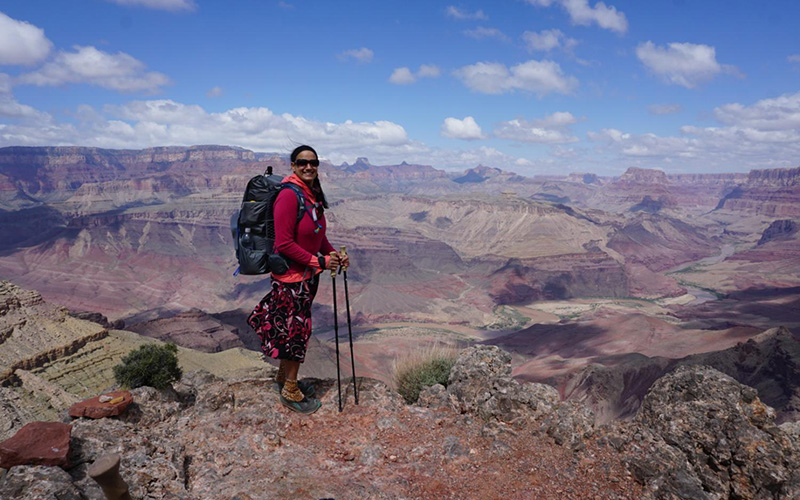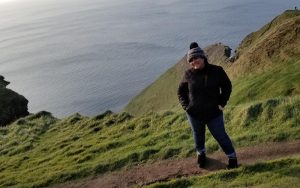
Sirena Rana Dufault has twice hiked the Arizona Trail. The farther you get into the backcountry, she says, the fewer hikers of color you see. “It’s just that feeling like … an otherness.” (Photo courtesy of Sirena Rana Dufault)
PHOENIX – Sirena Rana Dufault has hiked Mount Lemmon, outside Tucson, more times than she can say. But she still has a sense of wonder, noticing little things, including a dust-colored lizard skittering past.
“Oh my gosh!” she said, scooping up the tiny creature. “Look at him! He’s adorable! … He’s like a dinosaur!”
Dufault, 44, appears at home here, in a pine forest, on a trail.
“I want other people to experience this,” she said. “And I want other people to feel like they’re welcome to experience this.”
But she knows not everyone does, for all sorts of reasons. Sometimes it’s about physical ability. Sometimes it’s about transportation. And sometimes it’s about the color of your skin.
“If you just see people who don’t look like you, it just feels different,” Dufault said.
As the daughter of a father from India and mother from Italy, Dufault gets it. She has hiked the entire 800-mile Arizona Trail – twice – and said the farther you get into the backcountry, the fewer hikers of color you see.
“It’s just that feeling like, like an otherness,” she said.
And that can be intimidating and limiting.
In Phoenix, Adriana Garcia Maximiliano, 26, loves hiking but has never taken a backpacking trip alone.
“Not feeling safe has definitely … kept me from enjoying that,” she said. “And you know, maybe one day I will, and but I don’t feel that right now.”
And just to be clear, Garcia, who was born in Mexico, was talking about safety from other people.
Jaye McAuliffe is white but feels that way, too. As a transgender woman, McAuliffe feels vulnerable in the wilderness in a way she never did before she came out.
“It might be way more likely that I get lost or get attacked by a bear, but the fear of other people, definitely weighs stronger in my mind,” she said.
That fear isn’t something that Anel Arriola, 35, feels – although her mother sure used to – whenever Arriola goes on a hike. Her issue is the lack of awareness among Hispanics of hiking opportunities across the state.
Even now, she said, in a time when there’s so much information about trails online and on apps, the Hispanic community – and especially the Spanish-speaking community – is largely left out of the conversation.
When she moved here from Mexico City, she was young and bilingual, but still, she said, “it took me to meet someone who was hiking for me to actually get out and hike.”

For some, the problem isn’t fear of the outdoors, it’s not knowing what opportunities are available to them. Anel Arriola, who was born in Mexico, said it took her several years after moving to the U.S. to start hiking. (Photo courtesy of Anel Arriola)
That someone was Arriola’s sister. But not everyone has that person in his or her life, someone to help open the invisible door that keeps people locked out of the wilderness.
That’s where Dufault hopes to help.
Back on Mount Lemmon, she spots a young Indian woman walking toward her with a baby on her back.
“Hi! Do you mind if I take your photo?” Dufault asked, and she and the woman struck up a conversation.
Dufault is writing a book “Day Hikes on the Arizona National Scenic Trail,” set to be released in 2020 by Wilderness Press. The book will break down the 800-mile trek into dozens of shorter, digestible hikes for different ability levels. But perhaps just as important, it will include photos of all types of people on the trail.
Dufault will soon be submitting to her publisher pictures of black hikers, brown hikers, LGBTQ hikers.
“If you look through magazines and anything about hiking, and it’s just all a bunch of people that don’t look like you. It’s not as inviting,” she said, “and doesn’t make you feel like you have a place.”
And she thinks everyone has a place here – even her, a former Chicago resident who only got into hiking in college, after she was hit by a car while walking and developed fibromyalgia.
Before she started hiking, she was on the road to giving up.
“This gave me my life back,” she said.
Then her eyes lit up and darted away, toward an explosion of blue flowers on the side of the trail. She looked delighted, as if it was the first time she’d ever seen them.
This story is part of Elemental: Covering Sustainability, a multimedia collaboration between Cronkite News, Arizona PBS, KJZZ, KPCC, Rocky Mountain PBS and PBS SoCal.
Follow us on Twitter.